IRGC Navy Establishes Shadow Basij Navy
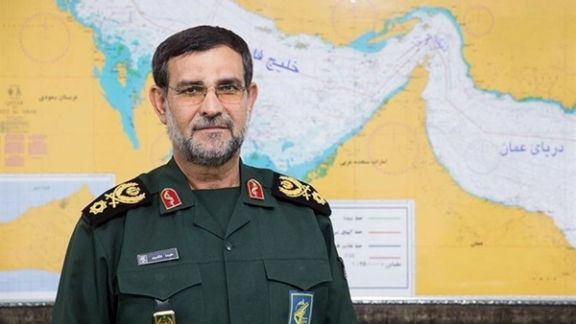
The Islamic Revolution Guards Corps (IRGC) Navy has established a voluntary unit with scope to carry out marine military operations, according to a top commander.

The Islamic Revolution Guards Corps (IRGC) Navy has established a voluntary unit with scope to carry out marine military operations, according to a top commander.
Local sailors will be allowed to carry out missions on vessels armed with rockets, according to IRGC Navy Commander Rear Admiral Alireza Tangsiri, who said the naval Basij has been organized after the successful formation of the maritime Basij in the Persian Gulf.
According to local reports, he said the maritime Basij in the Persian Gulf includes 55,000 voluntary forces with 33,000 vessels, noting that the second phase will be established in the Caspian Sea.
Tangsiri said the naval Basij involves large boats and launches that can sail as far as Tanzania. The shadow navy will have a presence in a series of coastal villages in southern Iran which have been equipped with military vessels.
“The Basij forces use those vessels that are furnished with weapons such as 107mm rockets, and fire them when necessary,” he said.
The revelations come against the backdrop of heightened tensions prompted by attacks on commercial shipping off the coast of Yemen, attributed to Iran-backed Houthis. Simultaneously, Washington is considering reinforcing measures to protect shipping in the Red Sea, where the Yemeni Houthis, with support from Iran, have targeted vessels in recent weeks.
Despite steering clear of direct military involvement in the Israel-Hamas conflict, Iran has leveraged allies such as the Houthis and militant groups in Iraq and Syria to target both Israel and American interests in the region.
Criticism has been directed at the Biden administration for perceived shortcomings in deterring Iran and its proxies in the Middle East, Iran's involvement in the seizure and harassment of vessels forcing the United States to bolster its military presence in the region.

Iran-backed Houthis threatened on Tuesday to ‘sink’ US warships, hours after Washington launched a multinational force to protect vessels transiting the Red Sea.
“We have capabilities to sink your fleet, your submarines, your warships,” a top Houthi official said, according to the IRGC-affiliated Tasnim news agency. “The Red Sea will be your graveyard.”
The new maritime coalition includes Britain, Canada, France, Italy, Spain, Norway, Netherlands, Seychelles and Bahrain. It has been formed in response to Houthi attacks on commercial vessels passing through the Bab el-Mandeb Strait and the Red Sea, transiting between Asia and Europe through the Suez Canal.
In the past few days, half a dozen shipping companies, including four of the biggest five, have ceased operations on this route, citing security concerns for their assets and their personnel.
“This is an international challenge that demands collective action,” US defense secretary Lloyd Austin while in Bahrain on his tour of the Middle East. “Therefore today I am announcing the establishment of Operation Prosperity Guardian, an important new multinational security initiative.”
It is not clear how this naval force seeks to stop Houthis from launching Iranian drones and missiles at vessels transiting the Red Sea. The naval force can only shoot down missiles and drones fired by the Houthis, but short of a military response, the Iranian proxy force can continue to disrupt shipping.
What is known is that some countries will conduct joint patrols, while others provide intelligence support in the southern Red Sea and the Gulf of Aden.
Several other countries have also agreed to be involved without being named, according to Associated Press. Nevertheless, the Biden administration would have a hard time selling it as a victory, since of the many Arab (and Red Sea) states only Bahrain has agreed to join the coalition. The Arab states, including Saudi Arabia, seem to fear the consequences of being seen as siding with the Israelis and the Americans.
The Biden administration has so far refrained from striking back at the Iranian-backed Houthis in Yemen. In his press conference Monday, Secretary Austin refused to answer a question as to why the Pentagon had not conducted a counterstrike.
Biden critics say his soft Iran policy is to blame for emboldening not only the regime in Tehran, but its proxies in Iraq, Syria, Yemen and Lebanon.
“This is beyond ridiculous,” said Senator Dan Sullivan in a thread posted on X, “as part of the Biden administration’s day-one appeasement strategy toward Iran, they delisted the Houthis, an Iranian terror proxy, as a foreign terrorist organization… Now, hardly a day goes by without another headline about the Houthis striking commercial vessels in the region.”
Last weekend, IRGC’s commander-in-chief taunted Americans, claiming that they’d leave the region soon.
“The US and Israel are reliving their bitter experiences,” said Maj. Gen. Hossein Salami. “Did they find victory in their occupation of Afghanistan? Were they able to stay in Iraq after its occupation? They are gradually packing up to leave this land.”
The Biden administration has asked the UN Security Council to intervene in order to stop Houthi attacks in the Red Sea. In a letter to council members US Ambassador Linda Thomas-Greenfield said the attacks on commercial ships threaten “international maritime security and international commerce.”
On Monday, oil giant BP announced that it will pause all shipments of oil through the Red Sea due to “deteriorating security situation” in the region. This could turn into a major headache for world’s big economies, if other oil companies were to follow BP.
“Biden’s failure to respond to Iran-backed militia attacks on shipping is going to start hitting Americans' pocket books,” wrote Senator Ted Budd on X.
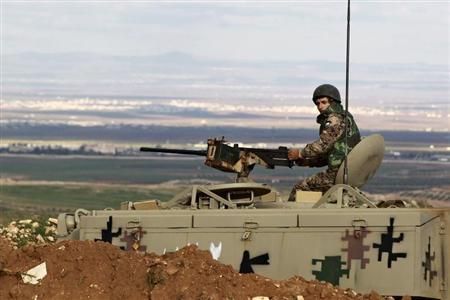
Jordan's army foiled a plot on Monday by dozens of infiltrators from Syria linked to pro-Iranian militias, who crossed its border with rocket launchers and explosives.
Jordan’s State broadcaster said the army blew up a vehicle laden with explosives as it resisted the biggest armed cross-border operation to smuggle weapons and drugs in recent years.
The army earlier said the infiltrators had fled back across the border after injuring several army personnel in the latest of several major incursions since the start of the month that has left one Jordanian soldier and at least a dozen smugglers dead.
Intelligence sources said Jordanian jets launched rare raids into its northern neighbor Syria against hideouts of Iranian-backed drug smugglers in retaliation against the smuggling operation. Iran controls thousands of fighters in Syria for more than a decade, when it got involved in the country’s civil war to support the Syrian strongman Bashar al-Assad.
They said the bombing targeted homes of leading drug dealers and farms that intelligence showed were safe houses for the heavily armed traffickers who have also used drones to drop their hauls.
Earlier officials had said the Jordanian army was considering conducting pre-emptive strikes inside Syria against those militias linked to the drug trade and their facilities in a bid to stem what they say is an alarming rise in cross-border incursions.
Jordanian officials, like their Western allies, say that Lebanon's Iran-backed Hezbollah group and pro-Iranian militias who control much of southern Syria were behind a surge in drug and weapons smuggling.
"Jordan knows the country that stands behind this. It's Iran that is sponsoring these militias. These are hostile military actions against Jordan on its territory," said Samih Maayteh, a former minister briefed by officials on developments.
Iran and Hezbollah say the allegations are part of Western plots against the country. Syria denies complicity with Iranian-backed militias linked to its army and security forces.
UN experts and US and European officials say the illicit drug trade finances a proliferation of pro-Iranian militias and pro-government paramilitary forces created by more than a decade of conflict in Syria.
War-torn Syria has become the region's main site for a multi-billion-dollar drug trade, with Jordan being a key transit route to the oil-rich Gulf states for a Syrian-made amphetamine known as captagon, Western anti-narcotics officials and Washington say.
The army which said it had seized nearly five million pills of captagon on Monday in one of the largest hauls in recent years, warned it would "continue to track these armed groups and prevent any attempt to undermine the kingdom's national security".
"The last few days have seen a spike in these operations that are changing from infiltration attempts and smuggling to armed clashes with the goal of crossing the border by force and targeting border guards," the army statement added.
Jordan's Foreign Minister Ayman Safadi last week told Iran's Foreign Minister Hossien Amir-Abdollahian during a meeting in Geneva that Tehran should do more to rein in militias it finances that are active along the Syrian-Jordanian border, officials say.
The raids by Jordanian jets come as the monarch, a staunch US ally, discussed bolstering the country's defenses with the top US commander, General Charles Q. Brown, chairman of the Joint Chiefs of Staff.
Jordan has been promised more US military aid to improve security on the border, where Washington has given around $1 billion to establish border posts since the Syrian conflict began in 2011, Jordanian officials say.
Report by Reuters
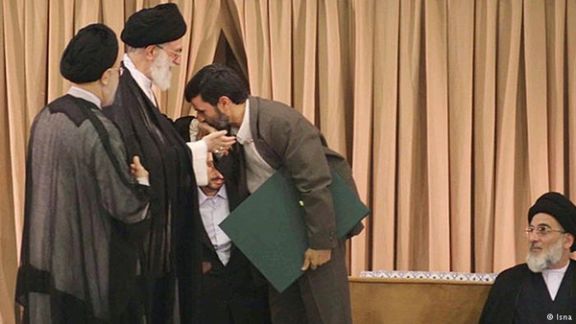
The leader of Iran’s ultra-hardliner Paydari Party is paving the way for the return of former President Mahmoud Ahmadinejad to politics, one of his former aides claims.
In an interview with the conservative Khabar Online, excerpts of which were published Monday, Abdolreza Davari alleged that the Secretary General of Paydari, Sadegh Mahsouli, in a recent interview, has signaled to the regime that Ahmadinejad is prepared to backtrack from his controversial behavior in recent years if he is given a share in power.
The former president began criticizing the regime after he was not allowed to run again in 2017 and his defiance gradually increased to the point of attacking Supreme Leader Ali Khamenei directly for multiple crises in the country. However, he has been silent for more than a year, keeping a low profile.
“They want to revive and restore the status of Mr. Ahmadinejad within their organization,” Davari who once served as an advisor to Ahmadinejad but has completely distanced himself from him in the past few years, said. He went on the say that Paydari is the only politic al force engaged in reviving Ahmadinejad’s political status.
These comments were made a week after in an interview with the Revolutionary Guards (IRGC) linked Fars News Agency, Mahsouli praised Ahmadinejad, calling him “charismatic” and a person with “innate management capabilities” and a good command of many things including the economy and diplomacy.
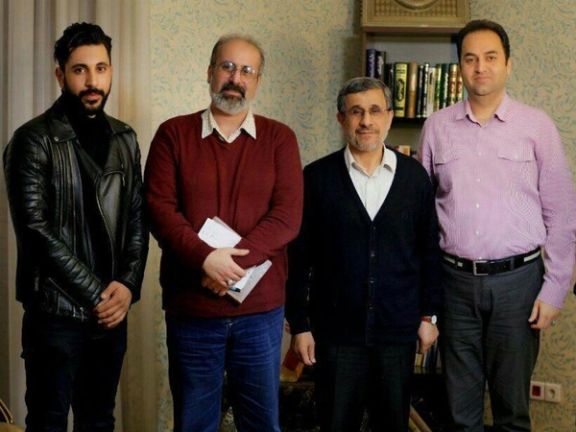
At the same time, Mahsouli who says he has not had any contact with Ahmadinejad in twelve years, showered some praise on Raisi and his administration but claimed that his party does not have anyone in the government. Contrary to this assertion, it is a well-known fact in Iran that Paydari’s ultraconservative members hold many positions in the Raisi administration.
Mahsouli who has led the Paydari Party in the past three years is a former Revolutionary Guard officer and a business tycoon who served as minister of interior and minister of welfare and social security under Ahmadinejad.
Political rivals and critics such as Afshar Soleimani, a former diplomat, allege that he amassed his wealth when Ahmadinejad allowed him to control the oil swap business with the Republic of Azerbaijan in the early 2000s, when he was a governor.
Soleimani also alleged in an interview last week that Mahsouli and Ahmadinejad only pretend to be not on good terms and pointed out that neither has ever spoken seriously ill of the other and will stand together again unless something drastic happens.
The Paydari (Steadfastness) Party has its appendages in all government institutions including the parliament where their members form a very influential minority that often takes a leading role amid the weak presence of established conservative and reformist parties.
Many believe Mahsouli, then interior minister, was the man behind the alleged rigging of the 2009 elections which secured a second term for the incumbent Ahmadinejad.
Both men were strongly supported by Ayatollah Mohammad-Taghi Mesbah-Yazdi, ultra-hardliners’ spiritual father, who withdrew his support from Ahmadinejad after his fall from Supreme Leader Ali Khamenei’s grace in May 2011.
In another interview a year ago, Davari claimed that around eighty percent of high-ranking officials in the Raisi administration were picked from among those serving in high positions in Ahmadinejad’s government.
In the same interview he dubbed the Raisi administration as “Ahmadinejad’s third government”. He has also previously alleged that in the past few years the former controversial president has been of the belief that the Islamic Republic is doomed to collapse and when it does, he wants to be Iran's Boris Yeltsin “and commandeer all power in one go”.

Smugglers, involved in trafficking an Airbus aircraft engine in Iran’s Hormozgan province with a reported value of approximately $10,000, were convinced to pay a fine.
According to Fars News Agency, a government official revealed on Monday that the smugglers were condemned to pay around 200,000 dollars.
The case was exposed while according to officials and experts the country's aviation industry faces a serious crisis due to the grounding of more than 500 aircraft that need sanctioned parts.
Experts have cautioned that Iran's aviation fleet needs a minimum of four hundred new aircraft, but US economic sanctions resulting from Iran's controversial nuclear program have hindered the purchase of new aircraft, as well as the refurbishment and modernization of the fleet.
Without specifying details about the Airbus aircraft engine smuggling case or the importing company, an official mentioned, "The said company, as the first-row defendant, has been sentenced to a two-year suspension of activities. Additionally, considering the financial loss, they are obligated to pay a fine of nearly $155,000."
The CEO of the company has been sentenced to pay around $45,000 and has been prohibited from establishing an office and engaging in legal and business activities for three years.
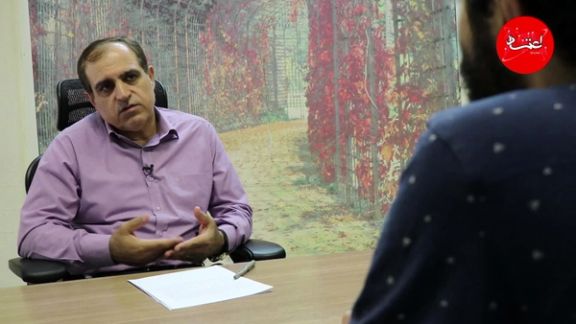
Mehdi Rahmanian, the Editor-in-Chief of Shargh newspaper, has been deemed a criminal after the publication of a survey indicating that most Iranian are opposed to compulsory hijab.
Akbar Nasrollahi, the spokesperson for the Judiciary's Political and Media Crimes Courts, stated that the charges against Rahmanian involve the "dissemination of false information," based on the complaint filed by the Tehran Prosecutor regarding the "misleading headline" of an 84% opposition to compelling women to observe hijab, dated October 25, 2023.
On October 24, Shargh reported the results of its survey, reporting an 84% opposition among the public to mandatory hijab for women. The survey involved the participation of over 12,300 individuals.
The survey was released following the approval of a bill titled Chastity and Hijab by the Iranian parliament, indicating intentions to tighten restrictions in this regard.
Following the court session, addressing the complaint of the Supervisory Board of Press against Rahmanian, Nasrollahi noted that a verdict would be issued subsequently.
Simultaneously, the results of the survey were removed from Shargh's website.
Despite four decades of implementing the policy of compulsory hijab, Iranian women, especially after the recent nationwide protests in Iran, have openly opposed the policy by publicly removing their mandatory headscarves.